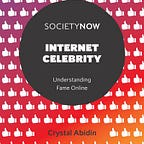What even is an influencer?
This will be my first post in a series that will critically discuss the 2018 book by Crystal Abidin, ‘Internet Celebrity: Understanding Fame Online’. Under ‘web 2.0’ (O’Reilly, 2009), anyone can post content on YouTube, Instagram and other social networks and generate an audience, thus becoming an influencer.
So, what are influencers, anyways?
Although many of us will only think of the ‘influencer’ and the internet celebrity under an Anglocentric lens, Japan and more notably, China also has these sorts of celebrities. They call them ‘wanghong’, meaning ‘red on the internet’. Abidin describes these influencers as ordinary people with no ‘demonstrable talent’ (Abidin, 2018, pg. 3) but people who are able to generate internet traffic with their looks and therefore generate profit. Under this premise, we see online celebrities as a commodification (Dyer & McDonald, 2019) in order to generate profit.
Whilst this arrangement is largely mutually beneficial to both the influencer and the business owners, there have been notable backlashes in recent years. As Abidin mentioned, Zoe Sugg (Zoella) has had somewhat of a fall from grace in recent years following the scandal surrounding her Times best-selling book, ‘Girl Online’ that sold 78,000 copies in the first week! Eventually, Penguin confirmed that the book was, in fact, ghostwritten, causing Zoe to lose a lot of credibility with her loyal and trusting fans.
Flash forward to 2017 and Zoe is in yet another controversy…
‘Zoella’ is now a lifestyle brand of itself, selling many Christmas gifts in Boots. Great value for money? I think not.
They released a ’12 Days of Christmas’ advent calendar retailing for £50! The contents were even more shocking to customers, most of which not being worth over a pound. Understandably, customers were furious with the price and accused Sugg of blatantly exploiting her young and impressionable fans. YouTuber ‘JaackMaate’ aka Jack Dean posted a video critiquing the ‘cash grab’ that boasted over 5.7 million views (JaackMaate, 2017). Because of all of this backlash, the calendar was reduced to half price and lead Sugg to post a teary-eyed apology video for the debacle (Oppenheim, 2017).
Although ten years ago, breakouts like Sugg’s were few and far between, Abidin notes that today it is not uncommon for internet celebrities to rival traditional celebrities in fame and global popularity. There has been a progression, she argues that these celebrities have gone from ‘micro-celebrities’ with niche audiences, often confined to creating content in their homes, to fully-fledged celebrities, making a cross-over to the mainstream to widen their reach. The influencer becomes a ‘human brand’ (Khamis, Ang & Welling, 2017). This idea is not a new one, the idea of ‘self-branding’ has been discussed since the rise of ‘celebrity’, the new age of influencers popularised this idea and made it seem much more attractive to advertisers (Labrecque, Marcos & Milne, 2011). They can now bring their following onto any platform with them, rather than relying on the mainstream platform to provide the audience for them. this creates a win-win for both parties- exposure for the influencer and a wider audience for the platform.
We see this in mainstream primetime shows like Strictly Come Dancing featuring YouTuber influencer Saffron Barker as a contestant, Jonathan Ross having YouTuber and rapper KSI as a guest among mainstream stars and other influencers offered Netflix and movie deals.
It is clear that the online celebrity is here to stay. The public relates to people they deem ‘ordinary’, allowing their presence to grow not only online, but in traditional media forms as well. I see the lines between online and traditional media forms blurring more in the years to come. I can foresee influencers we see online making more of a widespread transition onto television in the near future.
Until next time,
PurpleBlogs :)
References
Abidin, C. (2018). Internet celebrity. Bingley: Emerald Publishing.
Blair, O. (2016). Zoella on being ‘attacked’ for using a ghostwriter: ‘It was horrible… I felt it had all been ruined’. Independant. Retrieved from https://www.independent.co.uk/news/people/zoella-youtube-book-girl-online-going-solo-ghostwriter-attacked-response-a7342336.html
Dyer, R., McDonald, P. (2019). Stars. United Kingdom: Bloomsbury Publishing.
JaackMaate. (2017, November 11). ZOELLA’S £50 AVDENT CALENDAR | HONEST, BRUTAL REVIEW [Video]. YouTube. https://www.youtube.com/watch?v=rA91BaJWYQw
Khamis, S., Ang, L., & Welling, R. (2017). Self-branding,‘micro-celebrity’and the rise of Social Media Influencers. Celebrity studies, 8(2), 191–208.
Labrecque, L. I., Markos, E., & Milne, G. R. (2011). Online personal branding: Processes, challenges, and implications. Journal of interactive marketing, 25(1), 37–50.
O’reilly, T. (2009). What is web 2.0. “ O’Reilly Media, Inc.”.
Oppenheim, M. (2017). Boot’s cuts price of Zoella’s £50 12 door advent calendar in half after YouTube star faces heavy criticism. Independant. Retrieved from https://www.independent.co.uk/life-style/gadgets-and-tech/boots-zoella-advent-calender-price-cut-half-12-door-youtube-star-fans-criticism-a8056006.html
